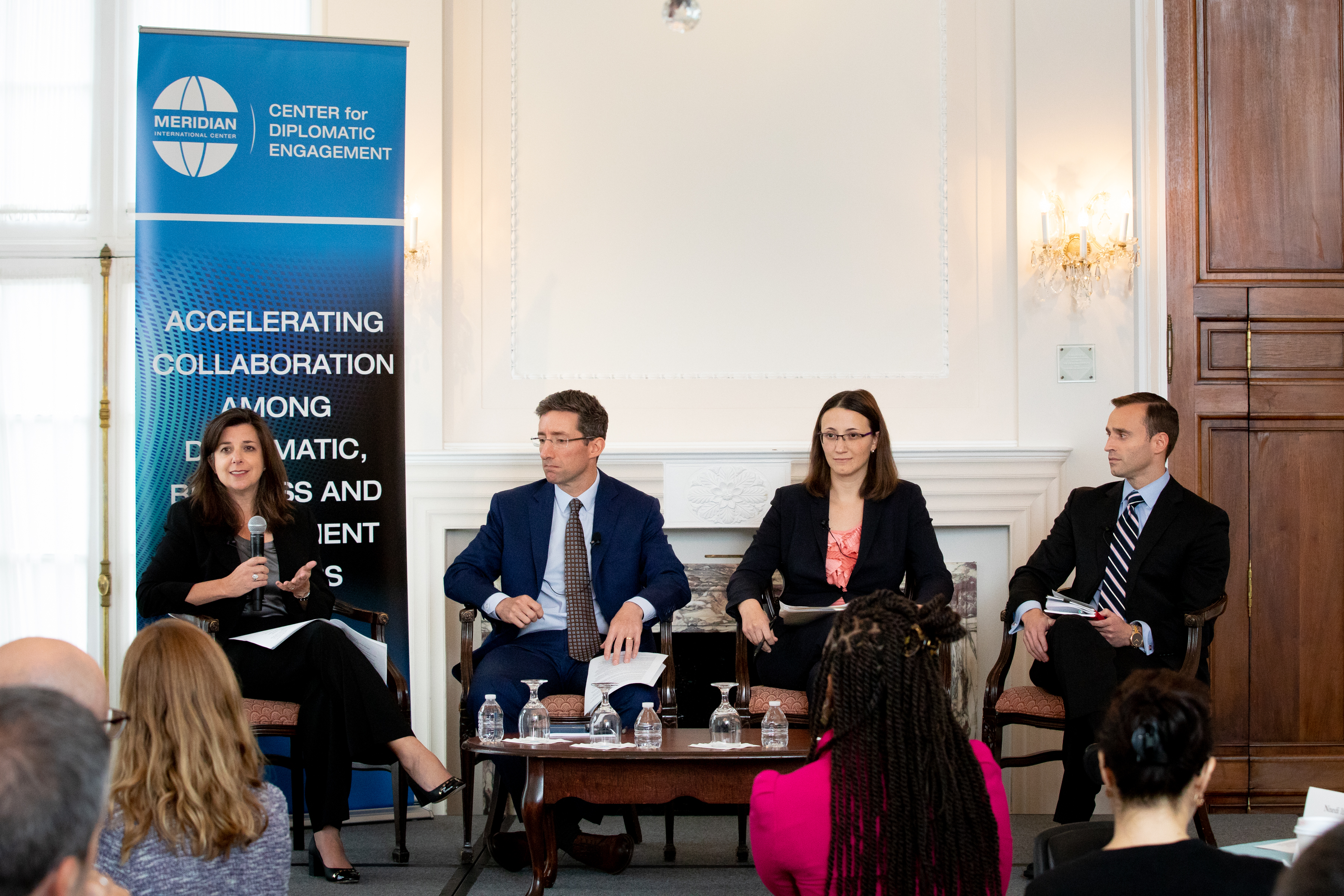Exploring Sanctions Development, Compliance and Enforcement

The complex web of economic sanctions can be exhausting for Americans, foreign governments and the private sector. With economic sanctions being leveraged at an increasing pace to meet national security and foreign policy goals of the United States, foreign diplomats are striving to understand how their countries and industries can stay in compliance and proactively work with U.S. government entities to provide input on the design and impact on sanctions programs. Indeed, a majority of foreign diplomats polled in a recent survey by Meridian reported that they would be interested in attending a program on sanctions.
On September 6, 2019, the Meridian Center for Diplomatic Engagement brought together a panel of unparalleled experts on sanctions alongside nearly 30 economic and political counselors and attachés. The program was moderated by Melissa Schwartz, Partner at Akin Gump. Speakers included:
- Andrew Keller, Chief Democratic Counsel, Senate Committee on Foreign Relations and former Assistant Secretary for Counter Threat Finance and Sanctions in the State Department’s Bureau of Economic and Business Affairs
- Joshua Mater, Deputy Director (Acting), Office of Sanctions Policy and Implementation, U.S. Department of State
- Sara Thannhauser, Deputy Assistant Director, Policy Division, Office of Foreign Assets Control, U.S. Department of the Treasury
The panelists elaborated on their respective roles in the development and implementation of sanctions and explained how their offices work with each other to navigate the political, logistical and enforcement channels. They examined the changing national security and foreign policy goals of sanctions programs and the changing balance between the Legislative and Executive branches in the imposition of sanctions. Through the discussion, panelists also highlighted the most effective sanctions programs, which they categorized as resulting in a change of behavior and outlined how these programs have been removed.
Stakeholder engagement is of paramount importance to Capitol Hill, the Treasury Department and the State Department. Attendees were encouraged to meet with each of the offices and discuss any concerns or obstacles that their citizens and private sector experience as a result of sanctions programs. The involvement and compliance of the international community is vital for the success of U.S. sanctions programs.
The Meridian Center for Diplomatic Engagement accelerates collaboration between the international diplomatic corps and the U.S. public and private sectors to address global challenges and opportunities facing the United States and the world today. Meridian convenes programs across borders, parties and industries enabling participants to connect in intimate settings with top officials and policy-makers, dive deeply into issues, understand how Washington works and strengthen peer-to-peer relationships. Our Diplocraft series provides senior diplomats with a greater understanding of the inner workings of Washington through policy deep dives and peer networking opportunities. The series of convening programs provides context on key areas of mutual concern.
This program was implemented in cooperation with Akin Gump, a Meridian Center for Diplomatic Engagement founding partner.
Useful Resources
U.S. Treasury Department's Office of Foreign Assets Control
Summary: This is one of the most important and extensive sources of information pertaining to U.S. sanctions. The site includes:
- Specially Designated Nationals and Blocked Persons List (SDN) Human Readable Lists
- Consolidated Sanctions List Data Files
- Sanctions List Search Tool
- Other OFAC Sanctions Lists
- 2019 OFAC Recent Actions
- Sanctions Program and Country Information
- Sanctions Programs and Acronyms
A Framework for OFAC Compliance Commitments
Summary: OFAC issued this framework in May 2019 to provide organizations subject to U.S. jurisdiction, as well as foreign entities that conduct business in or with the United States with OFAC’s perspective on the essential components of a sanctions compliance program.
- Akin Gump published this useful summary document, which highlights the key elements of the framework and also contains an assessment tool to evaluate the extent to which a compliance program addresses the key elements contained in the framework.
Iran Sanctions International Trade Alert
Summary: In this informative backgrounder, Akin Gump’s expert advisors break down what recent Iran sanctions mean for international business and financial institutions.
"What Are Economic Sanctions?"
Council on Foreign Relations “Backgrounder” Series, by Jonathan Masters
Summary: This article serves as an introduction to economic sanctions, their use in contemporary international relations and their effectiveness over time.
See more photos Learn more about DiplocraftProject summary
| Exploring Sanctions Development, Compliance and Enforcement | September 2019 | |
|---|---|
| Number of Attendees: | 31 |
| Regions: | Africa, East Asia and Pacific, Europe and Eurasia, Near East and North Africa, South and Central Asia, Western Hemisphere |
| Countries: | Afghanistan, Argentina, Belarus, Belgium, Chad, Colombia, Croatia, Czech Republic, Denmark, Finland, Georgia, Hungary, Iceland, Indonesia, Italy, Lebanon, Malaysia, Oman, Peru, Romania, South Sudan, Thailand |
| Impact Areas: | Business and Trade, Foreign Policy |
| Program Areas: | Diplomatic Engagement |
| Partners: | Private Sector |








